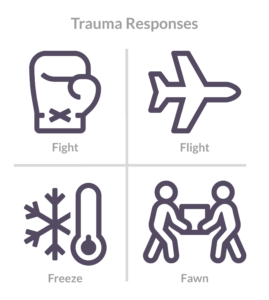By Christa Banister
Chances are, you’re familiar with the fight, flight, or freeze responses to trauma.
We’ve all heard about the frenzied mother lifting a 3,000-pound car to save her child. Maybe we’ve noticed how we’ll automatically jump away from a snake while walking in the woods. Or feel that immediate spike of adrenaline when you may or may not be going the speed limit and see a police car.
The fourth type of trauma response that might not immediately spring to mind, however, is fawning.
What is Fawning?
Ever meet someone who people describe as “selfless?” Who moonlights as a pro bono therapist? That almost too-good-to-be-true guy or girl who is willing to dispense helpful advice at a moment’s notice and will listen, console, and encourage without expecting much in return?
As sacrificial and admirable as that individual appears on the surface — especially for those on the receiving end of their goodwill — that over-accommodating nature may actually be a fawn response to trauma.
 So what is fawn response, exactly?
So what is fawn response, exactly?
First coined by therapist Pete Walker who addressed the phenomenon in his book Complex PTSD: From Surviving to Thriving, Healthline.com notes that fawning is often a maladaptive self-protecting mechanism that creates a feeling of safety in our interpersonal connections.
While the perceived upside of the fawn response to trauma may result in outcomes such as gaining others’ approval, feeling needed, and keeping the peace when there’s strife, this unending catering to other people’s desires and the inability to say no is quite harmful to the fawner’s overall development.
A 20-year-old man noted In USA TODAY how the behavior and neglect of an abusive father led to his early introduction of people-pleasing. He felt the only way to ensure his father’s happiness was to do everything he could to make him happy. A rather tall, not to mention, impossible, order for a young kid.
At school, he was the one everyone gravitated toward with their drama. As the compliments rolled in about how helpful he was, even those weren’t enough to sustain the feeling that something was missing from his life. There were needs clearly not being met that began with his early experiences of neglect and abuse.
When Behavior That Looks Healthy Isn’t
Without healthy boundaries and proper give-and-take with friends and loved ones, it’s easy to lose your identity and fail to prioritize your own well-being.
When considering the fight, flight, fawn responses, the latter may be mistaken as generosity: someone who naturally likes to help others and do the right thing.
But shifting your thoughts to others or failing to stand up for yourself in a conflict is often a mask that can lead to unhealthy friendships, relationships, and even disordered behaviors. Without healthy boundaries and proper give-and-take with friends and loved ones, it’s easy to lose your identity and fail to prioritize your own well-being.
For someone who struggles with eating disorders in particular, the tendency to fawn may get in the way of addressing the issue altogether. If you’re so focused on making others happy, you may not share your struggles — or feel like there’s even room for them — in the first place.
Feelings of guilt and rocking the proverbial boat may surge to the forefront, which is why it’s important to address the underlying trauma. Unlearning the fawn response and feeling seen is a crucial component in managing triggers of disordered eating and moving forward in a healthier way where your needs are met.
When People-Pleasing Is a Defensive Mechanism
There’s a thin line separating the agreeable, naturally helpful person from someone who defaults to people-pleasing behaviors in the interest of self-preservation. So how do you know if you’re fawning? A few signs may include:
- Being stretched thin because saying no to someone is impossible
- Making others feel comfortable and avoiding conflict so you can feel seen in close relationships
- Failing to open up to those closest to you unless you’re on the verge of a total breakdown
- Being more comfortable talking to a stranger about what bothers you to preserve your value in your closer relationships
- Feeling guilty for your actual feelings: anger, resentment, fear, etc.
- Saying “I’m sorry” for even the smallest things that don’t require an apology
- Taking the blame for other people’s cruddy behavior
- Not suggesting somewhere to eat or an activity and deferring to whatever others want to do
- Spacing out or withdrawing in social situations
- Compromising your own values to fit in
If any of these bullet points resonate with you, there are ways to unlearn your fawning tendencies. While these behaviors aren’t something that can be switched off with a snap of the fingers or addressed without a loving, trauma-informed support system, reclaiming your life, livelihood, and authentic self is possible.
We’re Here to Help
For women and girls struggling with an eating disorder, there is trusted, proven treatment at The Meadows Ranch. We can help you address the underlying trauma of your behavior so you can find healing and wholeness within yourself and have healthy relationships with others. Find out more about our groundbreaking approach that we use to customize programs to meet each patient’s specific needs. Let The Meadows Ranch help you begin your personal journey to wellness today.

